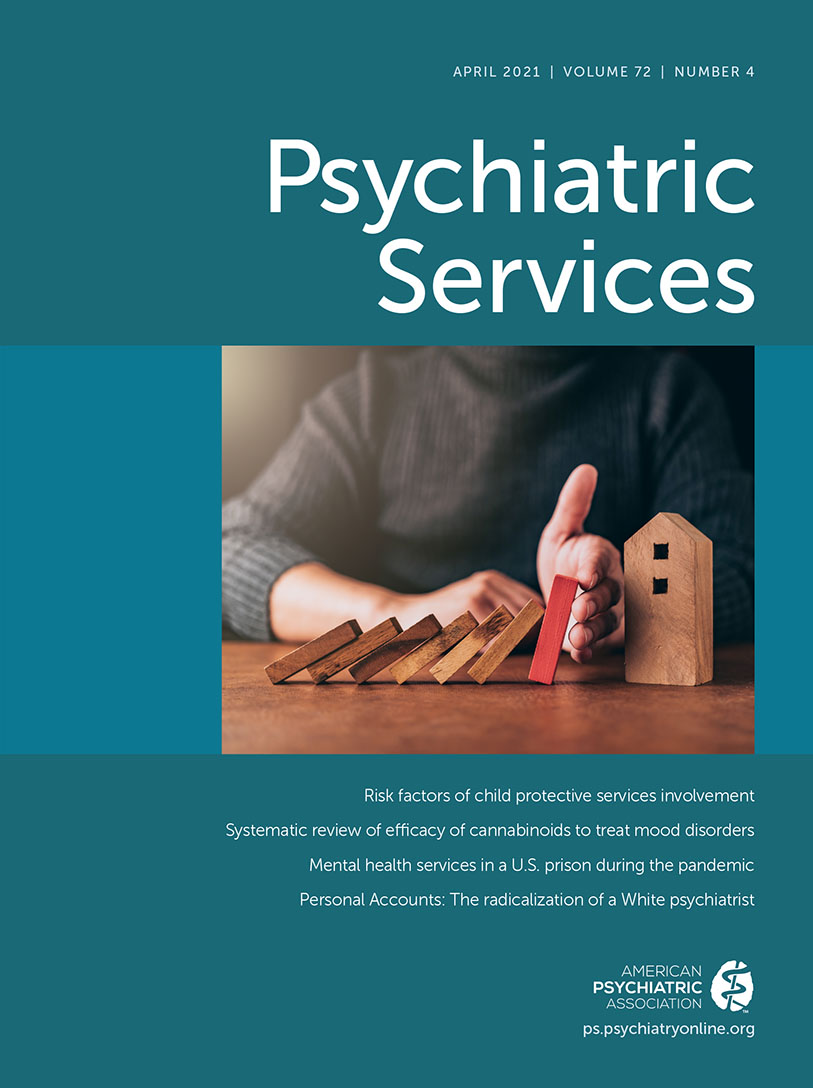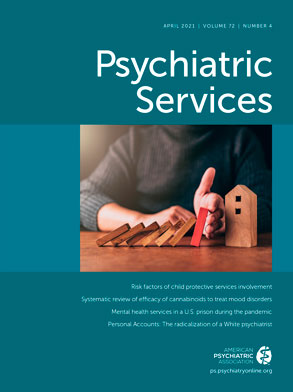As Ostrow et al. note in this issue, parents with serious mental illness are vulnerable to child protective services (CPS) involvement, to disruptions in relationships with children through voluntary or involuntary out-of-home placements, and, ultimately, to the termination of parental rights (
1). The authors bring important attention to the numerous risk factors associated with CPS involvement among parents with serious mental illness, comparing those with and without CPS involvement.
The risk factors for CPS involvement (e.g., lower levels of education, lower income), unfortunately, distinguish mothers and fathers with serious mental illness from parents without mental illness and from people with serious mental illness who are not parents (
2). For example, findings from a prior study indicate that parents with serious mental illness are less likely than parents without serious mental illness to be employed and more likely to be dependent on government assistance (
2). Even though parents with serious mental illness are more likely to be employed than adults with serious mental illness who are not parents, they are significantly more likely than parents without serious mental illness to be living in poverty.
Findings from the Ostrow et al. study (
1) also corroborate results from a prior, large-scale study that interviewed mothers with co-occurring psychiatric and substance use disorders living with or separated from minor children (
3). Data for that study were obtained between 1998 and 2003. Although the mothers did not differ in symptom severity, mothers separated from children had more children, had more often been homeless or in juvenile detention or jail, and had lower incomes than those living with all of their children. Mothers separated from children had more extensive histories of traumatic and stressful life events. They differed significantly from mothers living with children on items from the Life Stressor Checklist–Revised (
4) parallel to those reported in the Ostrow et al. study (e.g., unwanted or uncomfortable sexual experience). Mothers separated from children were significantly less likely to have been receiving outpatient counseling services, likely reflecting unmet service needs.
Perhaps the most significant finding of the Ostrow et al. study, although not explicitly stated, is that the situation for parents with serious mental illness and their families does not seem to have changed in the past 20 years. Parents with serious mental illness face the same challenges and risks that this population faced in 2000, with the same unmet service needs. Ostrow and colleagues (
1) conclude that interventions must be developed to target social disadvantages and stressors faced by parents and promote positive parenting. They highlight the missed opportunities to work with people with serious mental illness, to view parenthood as a reasonable or realistic life goal, and to view success in this role as a source of meaning and strength. To fail in this role, as the authors point out, may well undermine recovery-oriented outcomes.
The issue that remains is why these families’ needs have not been addressed by the mental health community or child welfare system. In a recent systematic review of recovery-oriented parent interventions, only three were identified: one in the United States, one in Finland, and one in the Netherlands (
5). In addition, an online intervention for parents with serious mental illness has been developed and tested (
6).
Given the dearth of interventions specifically targeted to these parents, adapting existing evidence-based parenting interventions to meet the unique challenges conveyed by serious mental illness would make sense. Although these interventions may not be readily available, some efforts at adaptation have been made, in particular for parents with depression and anxiety (e.g., the Mental Health Positive Parenting Program derived from the Triple P model) (
7). Alternatively, and with perhaps broader impact, existing evidence-based programs or practices (e.g., supported employment, supportive housing) could be infused with information about a person’s family status, wishes, and goals. A recent initiative in Massachusetts, developed with extensive stakeholder input, has resulted in the practitioner- and setting-agnostic ParentingWell Practice Profile (
8). The intention is to make parenting and family life a part of the routine conversation with the person served in any setting. By fitting this topic into the normal workflow, parenting and family life goals can be addressed, along with plans for training and employment, stable housing, symptom reduction, and illness management.
The child welfare system is often the system to provide services and supports to prevent family disruptions and to reunite parents with serious mental illness and their children when possible. The Adoption and Safe Families Act, the federal law that governs the child welfare system, requires child welfare agencies to provide “reasonable efforts” in most cases so that families can be reunified. Nonetheless, long-standing research, as cited in Ostrow et al. (
1), indicates that the child welfare system often fails to provide appropriate, individually tailored services to parents with serious mental illness, as well as those with other disabilities, perhaps because these resources do not exist. In turn, these families are disrupted or denied the opportunity to reunify.
More recently, Congress passed the Family First Prevention Services Act of 2017 (“Family First Act”), which may offer opportunities to expand the availability of resources and to develop and implement family-focused services for adults with serious mental illness who are parents. Specifically, the Family First Act provides Social Security Title IV-E funds for 12 months of in-home parenting skills programs, substance use treatment, and mental health services to keep families intact and children out of foster care. Child welfare agencies should use the Family First Act’s additional funds to provide services and supports that are individually tailored to meet the specific needs of parents with serious mental illness. However, this most likely requires a collaborative effort between service sectors—mental health and child welfare—to be most effective.
Ultimately, we need to shift the practice or treatment paradigm to a proactive rather than a reactive stance, to resilience rather than deficits, and to prevention rather than remediation. Researchers should explore the characteristics and factors that coalesce to make adults with serious mental illness successful as parents. Future intervention development could build on the identification and enhancement of strengths and the alleviation of stress and symptoms. Preventive intervention and mental health promotion should begin in childhood for all people, including those vulnerable to developing serious mental illness, when children learn to care for and take care of others.
Many parents with serious mental illness and their families have unmet needs, as corroborated by Ostrow et al.’s study. Mental health providers and the child welfare system must work together to ensure that parents with serious mental illness and their families are supported adequately. A social determinants of health framework suggests the value of changing both public policies and social norms to address inequities (
9). Adults with serious mental illness must have access to services and practitioners who support them in achieving all of their life goals, including parenting and family life. Mental health begins with families, and parenting for people with serious mental illness is a social justice issue.

